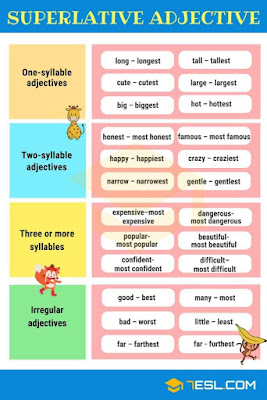3.- SUPERLATIVES (dos actividades)
Utilizamos los superlativos para indicar que una persona o cosa es lo
máximo en calidad dentro de un grupo. Antes de situar el superlativo se utiliza
el artículo “The”, porque hará referencia a que es el/la/lo único/a del grupo dentro
de la categoría que estamos hablando.
Example:
She is the most intelligent girl at school.
Noun (subject) + verb +
the + superlative adjective + noun
(object).
Ella
es la chica más inteligente de la escuela.
SUPERLATIVOS REGULARES
Adjetivos
de una sílaba
Se agrega la terminación
-est, para convertirlos en superlativos.
Nota: si el adjetivo cumple con la regla de los tres uno (Es de una sola sílaba, termina en una sola consonante, y antes lleva una sola vocal) se duplica la última consonante antes de agregar -est.
Ejemplo:
Big + g (última
consonante) + est = Biggest
ADJECTIVE
|
SUPERLATIVE
|
EXAMPLE
|
Tall
|
The tallest
|
Mario is the tallest guy I know.
|
Fat
|
The fattest
|
Camila weighs 85 kg, she’s the fattest girl in the
classroom.
|
Big
|
The biggest
|
I’m Coldplay’s biggest fan.
|
Sad
|
The saddest
|
Mario is the saddest when it rains.
|
Adjetivos
de dos sílabas
Se les agrega -est como
sufijo o ‘most’ antes del adjetivo. A los adjetivos terminados en ‘y’ se les
añade una ‘i’ antes del sufijo. Ejemplo: Busy - Busiest.
ADJECTIVE
|
SUPERLATIVE
|
EXAMPLE
|
Happy
|
The happiest
|
Georgia is the happiest girl in the neighbourhood.
|
Simple
|
The simplest
|
‘Yummy’ is the simplest song ever.
|
Busy
|
The busiest
|
Bruce is the busiest man in the factory.
|
Tangled
|
Most tangled
|
Maria has the most tangled hair I’ve seen.
|
Adjetivos
de tres o más sílabas
Son precedidos por “most” y
conservan su forma original.
ADJECTIVE
|
SUPERLATIVE
|
EXAMPLE
|
Important
|
The most important
|
My family is the most important thing for me.
|
Expensive
|
The most expensive
|
This is the most expensive watch I have.
|
ADJETIVOS
IRREGULARES
No siguen una regla
específica dado a que cambian su forma completa.
ADJECTIVE
|
SUPERLATIVE
|
EXAMPLE
|
Good
|
The best
|
Camilla is the best at maths.
|
Bad
|
The worst
|
I’m the worst at sports.
|
Little
|
The least
|
This is the least I can do for you.
|
Much
|
The most
|
I like her the most.
|
Far
|
The furthest/farthest
|
50 miles is the farthest I can get.
|
Video:
Infografía:
ACTIVIDAD 3:
COPIA EN TU LIBRETA EL SIGUIENTE CUADRO Y RESUÉLVELO.
ACTIVIDAD 4:
Entra al link asignado al grupo que perteneces y responde.




Comentarios
Publicar un comentario